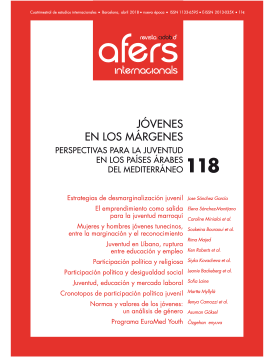Arab Mediterranean youth norms and values: a gender analysis
Keywords:
youth, gender, agency, cultural innovation, cultural norms, Arab Mediterranean countriesAbstract
Revista CIDOB d’Afers Internacionals, nº 118
Quadrimestral (January-April 2018)
ISSN:1133-6595 | E-ISSN:2013-035X
DOI: doi.org/10.24241/rcai.2018.118.1.201
This article reflects on the changes and continuities in the cultural values and norms of young men and women with regard to gender relations and roles in five Arab Mediterranean countries: Algeria, Morocco, Lebanon, Tunisia and Egypt. To do this, attention is given to the processes and practices of cultural innovation that have arisen among the region’s generations of young people since the 2011 uprisings. The empirical analysis is based on qualitative and quantitative data gathered through the multi-sited ethnographic fieldwork and international survey of the SAHWA research project. The analysis reveals young people who are social actors able to confront structural limitations and mechanisms of exclusion; at the same time, it describes the distinct way young men and women in the region inhabit the ambivalent condition of "waithood".
>> The full text articles of this issue are available only in Spanish Language
References
Abdelrahman, Maha. Egypt’s Long Revolution: Protest Movements and Uprisings. Londres: Routledge, 2015.
Al-Ali, Nadje; Ali, Zahra; Marler, Isabel. «The New Dynamics in the Inclusion and Empowerment of Young Women». En: The Arab Human Development Report 2016: Youth and the Prospects for Human Development in a Changing Reality. New York: United Nations Publications, 2016.
Al-Momani, Mohammad. «The Arab “Youth Quake”: Implications on Democratization and Stability». Middle East Law and Governance, vol. 3, n.º 1-2 (2011), p. 159-170.
Al-Rasheed, Madawi. «Sectarianism as Counter Revolution: Saudi Responses to the Arab Spring». Studies in Ethnicity and Nationalism, vol. 11, n.º 3 (2011), p. 513-526.
AUC-American University in Cairo. «National Case Study: Egypt». SAHWA National Case Studies, NCS-EG-1 (2016) (en línea) [Fecha de consulta: 01.03.2017] http://www.sahwa.eu/OUTPUTS/Other-publications/National-Case-Study-Egypt
Barsoum, Ghada. «Educated Young Women’s Employment Decisions in Egypt: A Qualitative Account». SAHWA Scientific paper, n.º 13 (2017) (en línea) https://www.cidob.org/en/publications/publication_series/sahwa_papers/scientific_paper/educated_young_women_s_employment_decisions_in_egypt_a_qualitative_account
Bayat, Asef y Dennis, Eric. «Who is Afraid of Ashwaiyyat? Urban Change and Politics in Egypt». Environment and Urbanization, vol. 12, n.º 2 (2000), p. 185-199.
Bourdarbat, Brahim y Ajbilou, Aziz. «Youth Exclusion in Morocco: Context, Consequences and Policies». Middle East Youth Initiative Working Paper, n.º 5 (2007).
Camozzi, Ilenya; Cherubini, Daniela; Leccardi, Carmen; Rivetti, Paola; Feixa Pampols, Carles y Sánchez García, José. «Youth Cultures: Values, Representations and Social Conditions». SAHWA Background Paper, n.º 3 (2015)
(en línea) [Fecha de consulta: 01.03.2017] http://sahwa.eu/OUTPUTS/Publications/SAHWA-Background-Paper-BP03-Youth-Cultures-ValoresRepresentations-and-Social-Conditions
CAWTAR-Center of Arab Women for Training and Research. «National Case Study: Tunisia». SAHWA National Case Studies, NCS-TN-1 (2016) (en línea) [Fecha de consulta: 01.03.2017]. http://www.sahwa.eu/OUTPUTS/Publications/National-Case-Study-Tunisia
CREAD-Centre de Recherche en Economie Appliquée pour le Développement. «National Case Study: Algeria». SAHWA National Case Studies, NCS-DZ-1 (2016) (en línea) [Fecha de consulta: 01.03.2017] http://www.sahwa.eu/OUTPUTS/Publications/National-Case-Study-ALGERIA
Dalacoura, Katerina. «The 2011 Uprisings in the Arab Middle East: Political Change and Geopolitical Implications». International Affairs, vol. 88, n.º 1 (2012), p. 63-79.
Dhillon, Navtej y Yousef, Tarik (eds.). Generation in Waiting: The Unfulfilled Promise of Young People in the Middle East. Washington, D.C.: Brookings Institution Press, 2009.
Esposito, John y Mogahed, Dalia. Who Speaks for Islam? What a Billion Muslims Really Think. Nueva York: Gallup Press, 2007.
Gana, Nouri (ed.). The Making of the Tunisian Revolution: Contexts, Architects, Prospects. Edimburgo: Edinburgh University Press, 2013.
Hanafi, Sari. «The Arab revolutions; The Emergence of a New Political Subjectivity». Contemporary Arab Affairs, vol. 5, n.º 2 (2012), p. 198-213.
Hashemi, Manata. «Aspirations, Poverty and Behavior Among Youth in the Middle East: Some Theoretical Considerations». The Muslim World, vol. 107, n.º 1 (2017), p. 83-99.
HEM-Institut des Hautes Etudes de Management. «National Case Study: Morocco». SAHWA National Case Studies, NCS-MO-1 (2016) (en línea) [Fecha de consulta: 01.03.2017] http://www.sahwa.eu/OUTPUTS/Publications/National-Case-Study-Morocco
Herrera, Linda. Wired Citizenship: Youth Learning and Activism in the Middle East. Londres: Routledge. 2014.
Herrera, Linda y Bayat, Asef (eds.). Being Young and Muslim. New Cultural Politics in the Global South and North. Oxford: Oxford University Press, 2010.
Honwana, Alcinda. «“Waithood”: Youth Transitions and Social Change». En: Foeken, Dick; Dietz, Ton; De Haan, Leo y Johnson, Linda (eds.). Development and Equity: An Interdisciplinary Exploration by Ten Scholars from Africa, Asia and Latin America. Leiden y Boston: Brill, 2014, p. 28-40.
Honwana, Alcinda y de Boeck, Filip (eds.). Makers and Breakers: Children and Youth in Postcolonial Africa. Trenton, NJ: Africa World Press, 2005.
Hoodfar, Homa. Between Marriage and the Market: Intimate Politics and Survival in Cairo. Berkeley: University of California Press, 1997.
Ismail, Salwa. Political Life in Cairo’s New Quarters: Encountering the Everyday State». Minneapolis, MN: University of Minnesota Press, 2006.
Khashan, Hilal. «Collective Palestinian Frustration and Suicide Bombings». Third World Quarterly, vol. 24, n.º 6 (2003), p. 1.049-1.067.
Khatib, Lina y Lust, Ellen (eds.). Taking to the Streets: The Transformation of Arab Activism. Baltimore: Johns Hopkins University Press, 2014.
Kouaouci, Ali. «Population Transitions, Youth Unemployment, Postponement of Marriage and Violence in Algeria». The Journal of North African Studies, vol. 9, n.º 2 (2004), p. 28-45.
Krueger, Alan. What Makes a Terrorist? Economics and the Root of Terrorism. Princeton, NJ: Princeton University Press, 2007.
LaGraffe, Daniel. «The Youth Bulge in Egypt: An Intersection of Demographics, Security, and the Arab Spring». Journal of Strategic Security, vol. 5, n.º 2 (2012), p. 65-80.
LAU-Lebanese American University. «National Case Study: Lebanon». SAHWA National Case Studies, NCS-LB-1 (2016) (en línea) [Fecha de consulta: 01.03.2017] http://www.sahwa.eu/OUTPUTS/Publications/National-Case-Study-Lebanon
LeVine, Mark. «Heavy Metal Muslims: the Rise of a Post-Islamist Public Sphere». Contemporary Islam, vol. 2, n.º 3 (2008), p. 229-249.
MacLeod, Arlene E. Accommodating Protest: Working Women, the New Veiling, and Change in Cairo. Nueva York: Columbia University Press, 1991.
Martín Muñoz, Gemma. «Arab Youth Today: The Generation Gap, Identity Crisis and Democratic Deficit». En: Meijer, Roel (ed.). Alienation or Integration of Arab Youth: Between Family, State and Street. Richmond, Surrey: Curzon Press, 2000, p. 17-27.
Moaddel, Mansoor y Karabenick, Stuart. «Religious Fundamentalism among Young Muslims in Egypt and Saudi Arabia». Social Forces, vol. 86, n.º 4 (2008), p. 1.675-1.710.
Mulderig, Chloe. «An Uncertain future: Youth Frustration and the Arab spring». Boston University The Pardee Papers, n.º 16 (2013).
Murphy, Emma. «Problematizing Arab Youth: Generational Narratives of Systemic Failure». Mediterranean Politics, vol. 17, n.º 1 (2012), p. 5-22.
Salehi-Isfahani Djavad. «Growing up in Iran: Tough Times for the Revolution’s Children». The Brown Journal of World Affairs, vol. 15, n.º 1 (2008), p. 63-74.
Salehi-Isfahani, Djavad y Egel, Daniel. «Youth Exclusion in Iran: The State of Education, Employment and Family Formation». Middle East Youth Initiative Working Paper, n.º 3 (2007).
Sánchez García, José. «Young-adults or Adult Waithood?». SAHWA Blog, 26 de noviembre de 2015 (en línea) [Fecha de consulta: 01.03.2017] http://www.sahwa.eu/BLOG/Young-adults-or-Adult-waithood
Sánchez-Montijano, Elena; Martínez, Irene; Bourekba, Moussa y Dal Zotto, Elena. SAHWA Youth Survey 2016 Descriptive Report. Barcelona: CIDOB, 2017.
Sciolla, Loredana. «Valori». En: Enciclopedia delle Scienze Sociali. Roma: Treccani, 1998 (en línea) http://www.treccani.it/enciclopedia/
valori_%28Enciclopedia-delle-scienze-sociali%29/Sherman, Julia y Beck, Evelyn T. (eds.). The Prism of Sex: Essays in the Sociology
of Knowledge. Madison: University of Wisconsin Press, 1979.
Sika, Nadine. «Youth Political Engagement in Egypt: from Abstention to Uprising». British Journal of Middle Eastern Studies, vol. 39, n.º 2 (2012), p. 181-199.
Silver, Hilary. «Social Exclusion: Comparative Analysis of Europe and Middle East Youth». Middle East Youth Initiative Working Paper, n.º 1, (2007).
Silvestri, Sara. «Religion and Social Cohesion at the Heart of the Intercultural Debate, Anna Lindt Report». Anna Lindh Foundation, 2014 (en línea) http://www.annalindhfoundation.org/report/religion-and-social-cohesionheart-intercultural-debate
Singerman, Diane. Avenues of Participation: Family, Politics and Networks in the Urban Quarters of Cairo. Princeton, NJ: Princeton University Press, 1995.
Singerman, Diane. «The Economic Imperatives of Marriage and “Wait” Adulthood: Emerging Practices, Identities, and Collective Life among Youth in the Middle East». Middle East Youth Initiative Working Paper, n.º 6 (2007).
Singerman, Diane. «Youth, Gender, and Dignity in the Egyptian Uprising». Journal of Middle East Women’s Studies, vol. 9, n.º 3 (2013), p. 1-27.
UNDP-United Nations Development Program. Arab Human Development Report 2016. Youth and the Prospects for Human Development in a Changing Reality. Nueva York: UNDP, 2016 (en línea) http://www.arab-hdr.org/reports/2016/english/AHDR2016En.pdf?download













